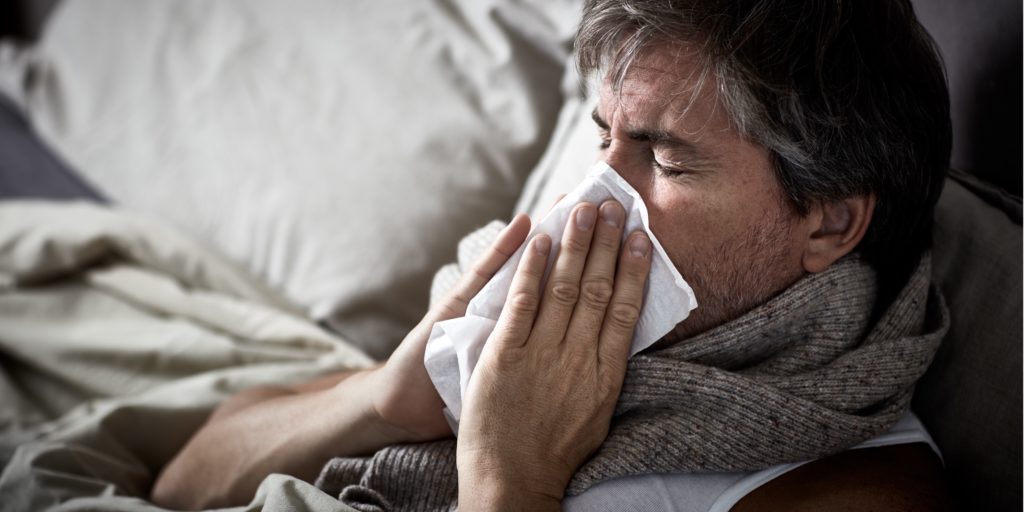Quick Hits
Daily brief research updates from the cognitive sciences

We all know that feeling when you’ve fallen sick, and you just want to curl up in your bed sheets and sleep the day away. You have little desire to move, and also probably aren’t hungry either.
You may not know, but can probably work it out, that this is actually good for you – it helps recovery. For example, in animals that are forced to eat when sick, mortality increases. So obviously the body is doing something that benefits us – even if it feels rubbish at the time.
But how this behaviour is controlled was a mystery: there could be multiple factors influencing this and multiple communication channels between body and brain. However, a group of researchers at Rockefeller University have now pinpointed a set of neurons that control this and the surprise is that it is only a small group of neurons that seem to influence this and not a distributed network. One small cluster that activates your sick behaviour.
This is in a region called the dorsal vagal complex, this sits at the base of the brain at the top of the spinal cord. And importantly it is before what is known as the blood-brain barrier. The blood-brain barrier is the brain’s protective wall that restricts what can get into the brain – the brain is a pretty important part of us so best to be safe. This means it receives input directly from the blood flowing through our bodies and can hence respond to this. The vagus nerve is the key parasympathetic pathway controlling multiple factors such as digestion, heart rate, and immune system function, and making this is an important crossroads for communication between the body and brain.
The team of researchers then activated this small population in neurons with mice who had been infected with dead bacteria to trigger an immune responses (but without getting sick). Activating or deactivating these cells increased sickly or reduced sickly behaviours.
So, there you have it, a small population of neurons slows you down when you’re sick – but, remember, it’s for your benefit.

Andy Habermacher
Andy is author of leading brains Review, Neuroleadership, and multiple other books. He has been intensively involved in writing and research into neuroleadership and is considered one of Europe’s leading experts. He is also a well-known public speaker, speaking on the brain and human behaviour.
Andy is also a masters athlete (middle distance running) and competes regularly at international competitions (and holds a few national records in his age category).
References
Anoj Ilanges, Rani Shiao, Jordan Shaked, Ji-Dung Luo, Xiaofei Yu, Jeffrey M. Friedman.
Brainstem ADCYAP1+ neurons control multiple aspects of sickness behaviour.
Nature, 2022; 609 (7928): 761
DOI: 10.1038/s41586-022-05161-7
More Quick Hits
How Sleep Helps Your Brain Manage Fear
Quick HitsDaily brief research updates from the cognitive sciences leep on i” is common advice for many reasons. Often to consolidate thoughts and help boost creativity. This is a well-known effect. We also know that sleep is the time that helps to...
Video games can boost children’s intelligence
Quick HitsDaily brief research updates from the cognitive sciences ell, this is not the answer many of us would expect, and it goes against other logic of spending more time doing other things such as reading or socialising with friends...
Just how many people get COVID brain?
Quick HitsDaily brief research updates from the cognitive sciences here are many questions still open about COVID and the brain. There is no doubt that long COVID exists, and this can have dramatic impacts on people’s lives. But just how...
Brain networks and losing weight – successfully or not
Quick HitsDaily brief research updates from the cognitive sciences s weight loss all in the mind? Well, with the danger of oversimplifying a complex topic, this latest research shows it is, and shows precisely how and with what networks. So,...
Reversing aging – with poo!
Quick HitsDaily brief research updates from the cognitive sciences ho wouldn't want to age better - well the results of an unsual study are in and the results are promising and may make many of you who are aging prick up your ears. The...
Brisk walking slows biological aging
Quick HitsDaily brief research updates from the cognitive sciences f you want to age better, then walk quicker, or those who walk quicker, age slower. That is the result of a recent study of 400,000 UK adults mapped to genetic markers of age...






